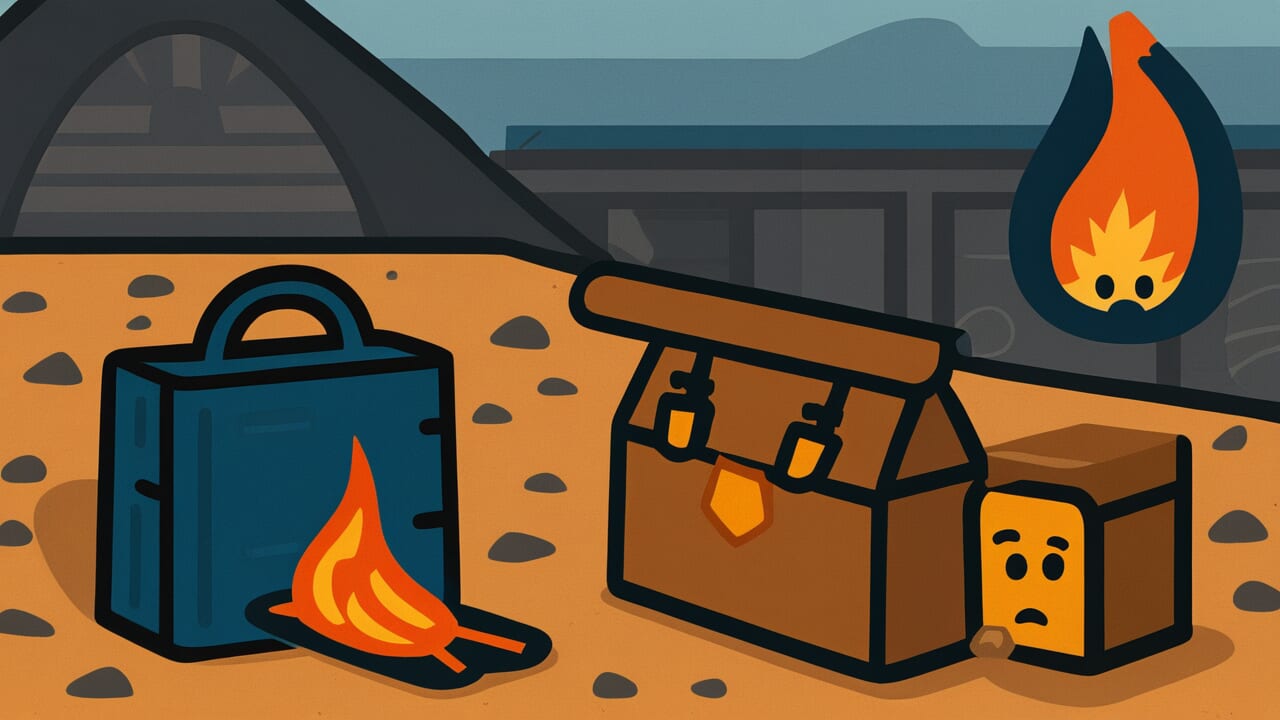How to Read “A thief may leave something behind, but fire leaves nothing”
Nusubito no torinokoshi wa aredo hi no torinokoshi wa nashi
Meaning of “A thief may leave something behind, but fire leaves nothing”
This proverb means that unlike theft, fire leaves nothing behind and burns everything completely.
Even if a thief breaks in, some belongings will remain. But if fire strikes, your house and all your possessions turn to ash.
This saying warns us about the terrifying power of fire.
People use it when teaching about fire prevention or calling for caution with fire. It also teaches that we should be very careful every day to avoid disasters we cannot undo.
Theft might allow you to minimize damage. But fire brings total destruction, taking everything away in an instant.
This makes fire a far more serious disaster. Even today, fire remains just as dangerous.
This proverb helps raise awareness about disaster prevention.
Origin and Etymology
The exact first written appearance of this proverb is unclear. However, it has been passed down through generations as a folk teaching about the terror of fire.
During the Edo period, people said “fires and fights are the flowers of Edo.” This shows how frequently fires occurred in Japan.
Wooden houses stood close together in urban areas. Once flames started, they spread instantly.
Many people lost all their belongings. This harsh experience likely gave birth to this saying.
The phrase “what a thief leaves behind” carries special meaning. Even a thief cannot take everything away.
Thieves steal valuable items selectively. They leave furniture and daily necessities behind.
These items help people rebuild their lives. But fire is different.
Flames do not care about value. They turn everything in their path to ash.
This contrasting expression emphasizes fire’s overwhelming destructive power. It vividly shows the difference between human-caused disasters and natural disasters.
Our ancestors used this wisdom to imprint the importance of fire prevention on people’s hearts.
Interesting Facts
Edo period townspeople were known for “not keeping money overnight.” Frequent fires partly caused this attitude.
No matter how much wealth you saved, fire could destroy it. So people developed the idea of spending money and enjoying life.
Traditional Japanese homes had a custom of preparing an “emergency box.” This box held the most precious items for fire evacuation.
But in actual fires, smoke and flames moved so fast that people often could not even grab this box. Historical records confirm this sad reality.
Usage Examples
- Fire is scarier than earthquakes. A thief may leave something behind, but fire leaves nothing, right?
- You really need to be careful putting out fires. A thief may leave something behind, but fire leaves nothing.
Universal Wisdom
This proverb carries deep insight about the different types of disasters humans face. Our ancestors learned from experience a fundamental truth.
Human-caused disasters and natural disasters differ completely in their thoroughness of destruction.
A thief is human. Thieves get tired and face time constraints. They make value judgments and choices.
This is why “something gets left behind.” But fire is different.
Fire has no will, no fatigue, no choice. It simply spreads, turning everything before it equally to ash.
This mercilessness and thoroughness define fire’s true nature.
Humans always live on the boundary between what we can control and what we cannot. Human-caused disasters allow room for negotiation.
We can find ways to respond and possibly limit the damage. But before the forces of nature, human wisdom and strength are limited.
This proverb teaches us humility. It warns against the arrogance of thinking we can control everything.
It shows that prevention is the greatest defense. Rather than regretting after loss, we should prepare before loss.
This wisdom forms the core of survival strategies humanity has gained through long history.
When AI Hears This
The crucial difference between a thief and fire lies in their operating principles. A thief is a willful agent who can judge the situation and decide “I should stop now.”
Fire, however, is an autonomous process. When fuel, oxygen, and heat come together, the reaction inevitably proceeds.
Complexity science explains this as the difference between “negative feedback” and “positive feedback.” A thief has built-in negative feedback through fear and satisfaction.
This means internal restraint functions like “I’ve stolen enough” or “This is too dangerous, I should quit.” But fire is a classic example of positive feedback.
Burning produces heat, heat causes surrounding areas to burn, which increases heat further. This chain expands automatically unless interrupted from outside.
Interestingly, we tend to overestimate “things with will.” We think humans can be negotiated with, persuaded, so somehow things will work out.
But truly dangerous things are self-replicating processes with no room for negotiation. Forest fires, disease spread, misinformation on social media—all share fire’s structure.
When conditions align, they continue spreading regardless of anyone’s will.
In modern society, what we should guard against may not be willful enemies. It may be autonomously growing systems.
Lessons for Today
This proverb teaches you how important daily preparation and prevention are. They help you avoid situations you cannot undo.
Not just fires, but life contains events that cannot be completely reversed once they happen.
Losing important data without backing it up. Regretting lifestyle habits after damaging your health. Destroying trust relationships in an instant.
These losses “leave nothing behind” and exist throughout modern society.
This proverb encourages you to develop foresight. Rather than responding after problems occur, prevent problems from happening.
That extra effort protects everything. Just like fire prevention, small daily attention and care in relationships, work, and health prevent major disasters.
Perfect prevention may be difficult. But simply being conscious can prevent many things.
This proverb gives you courage to act before regret.



Comments